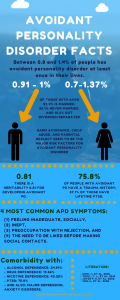What is avoidant personality disorder?
Avoidant personality disorder (Avoidant PD or AVPD) is a personality disorder characterized by lasting feelings of inadequacy and extreme fears of being rejected, ridiculed, disliked or criticized. As a result, people with avoidant personality disorder often feel socially inept, and (prefer to) withdraw from social activities and obligations, such as going to work, meeting with friends or doing activities that involve social interaction with others.
If people with avoidant personality disorder meet with other people, they usually feel out of place, insecure, tense, behave unnatural, and are critically observing other people’s behaviour. Other people can interpret their behaviour as odd and start to ridicule them. Unfortunately, this reinforces their self-doubt and increases their avoidant personality disorder symptoms. Although they crave for affection and acceptance, they usually are relatively isolated and lack a social support group who can help them when they are going through a difficult period. This can increase the AVPD symptoms even more, because it increases isolation.
Jump to:
- How to cope with AvPD?
- Living with someone who has AvPD. (coming soon)
- Interesting avoidant PD facts.
- Online counseling for avoidant PD.
- Take me to the homepage.
At Barends Psychology Practice, we offer (online) therapy for AvPD. Contact us to schedule a first, free of charge, online session. (Depending on your health insurance, treatment may be reimbursed).
Avoidant personality disorder – signs
Avoidant PD is usually only diagnosed in adulthood, due to the fact that the AVPD symptoms are long lasting and overlap with other mental disorders, such as social anxiety. Especially in adolescence and early adulthood, professionals are more likely to diagnose people with social anxiety, rather than Avoidant PD. If you look at the four most common avoidant PD symptoms, you see why: (1) feeling inadequate, socially, (2) inept, (3) preoccupation with rejection, and (4) the need to be liked before making social contacts [1].
(Advertisement. Scroll down for more information.)
Here is a list of avoidant personality disorder signs and symptoms:
- Preoccupation with being rejected, criticized or ridiculed in social situations.
- Feelings of inferiority compared to others, socially inept and personally unappealing.
- There is restraint within intimate relationships out of fear of shame and ridicule
- Avoids social interaction unless certain of being liked.
- Avoidance of occupational activities that involve social interaction, because of fear of criticism, disapproval, rejection, and ridicule.
- Unwilling to take personal risk or engaging in new activities out of fear of being ridiculed.
- Feelings of social inadequacy result in inhibition during new interpersonal situations.
(Advertisement. For literature, continue reading.)
Literature used for this page
- [1] McGlashan, T. H., Grilo, C. M., Sanislow, C. A., Ralevski, E., Morey, L. C., Gunderson, J. G., … Pagano, M. (2005). Two-year prevalence and stability of individual DSM-IV criteria for schizotypal, borderline, avoidant, and obsessive-compulsive personality disorders: toward a hybrid model of axis II disorders. The American Journal of Psychiatry, 162, 883–889.

